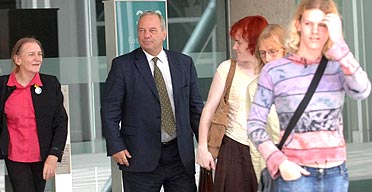
The UK's best-known expert on transsexualism was today found guilty of serious professional misconduct for rushing five patients into sex-changing treatments, but avoided being struck off.
The General Medical Council ruled that Russell Reid, who retired last year, could only return to work under strict conditions imposed for the next 12 months that mean he can only work under strict supervision.
He must provide the GMC with a record of his treatments of any patients with gender identity disorders such as transsexualism every three months.
The disciplinary panel ruled that Dr Reid must no longer prescribe patients with sex-changing hormones at the first appointment, nor without a firm diagnosis that they are transsexual or a proper psychiatric assessment.
The panel determined that the consultant psychiatrist was too quick to provide patients with hormones and to refer them for genital surgery.
"The panel considers that the seriousness of your misconduct lies in your lack of caution in initiating hormonal and surgical gender reassignment treatment in these patients without more careful and through investigation and assessment," said John Shaw, the panel chairman.
"The panel therefore determined that your misconduct was serious, and that you are guilty of serious professional misconduct."
Mr Shaw said Patient D, who mistakenly believed she was transsexual as a result of suffering from manic depression, only narrowly avoid an "unnecessary mastectomy" as a result of Dr Reid ignoring the second opinion of another psychiatrist that treatment should proceed with caution.
The panel chairman added that Patient C, a convicted paedophile, was still uncertain about his gender identity after having a sex change. The male-to-female transsexual has returned to living as a man and wants surgery to try to reverse his gender reassignment.
Mr Shaw said that although patients B, E and F remained in their reassigned gender roles and appeared not to have suffered harm, Dr Reid's treatment of them "fell well short of the standard of care to which [they] were entitled."
But the panel decided against striking Dr Reid off or suspending him because it did not consider "it would be in the public interest to deprive the [transsexual community] of an experienced and otherwise well-respected doctor."
Mr Shaw said: "[The panel] determined that it would be proportionate and sufficient, in the public interest as well as your own interest if you were to return to practice under strict conditions."
Speaking afterwards, Dr James Barrett, one of four NHS psychiatrists who brought the complaints against Dr Reid, said: "I'm pleased that it was felt that it amounted to serious professional misconduct. And I'm pleased that conditions to his practice were imposed for a year that mean he will operate in line with good practice."
Patient D said: "I think he's got off quite lightly, but at least he can't continue to rush people through treatment as he has in the past."
Another former patient of Dr Reid, not involved in the GMC case, said she was "disgusted" with the verdict.
Claudia, who regrets changing sex, is one of six former patients bringing a separate legal claim for damages against Dr Reid. She said the decision not to strike Dr Reid off was "absolutely scandalous".
"I'm deeply disappointed with the GMC ruling," she said. "If this had been about another group of people - not transsexuals - I think there would have been a much tougher sentence. Everything that has been taken from me - both physically and in the broadest human sense - can never be recovered."
However, Charles Kane, another former patient of Dr Reid, said he was glad the "kind-hearted" psychiatrist was not struck off.
Mr Kane, who complained to the GMC about Dr Reid but did not participate in the hearing, said: "I am happy with the verdict because with these conditions he cannot really treat anybody else the way he treated me."
Mr Kane had surgery to reverse his sex change in 2004. "I really believe that Dr Reid and the general public should view gender reassignment and sex change very seriously and this is a warning to doctors and patients not to rush into it," he said.
However, he added: "I think generally he [Dr Reid] is a kind-hearted doctor and he didn't really mean to be malicious to the patient. Most of the patients came here to support him because of this quality in him. He is a caring, almost father-figure."
Terry Reed, of the Gender Identity Research and Education Society, condemned the GMC inquiry.
She said: "This was a wholly inappropriate way of dealing with an individual whose approach to treatment is extremely successful and potentially far less damaging than the approach of some other doctors in the UK. He is more interested in caring for his patients than managing them."
The ruling came after a three-year investigation into Dr Reid, who the GMC earlier this week said had treated the five patients inappropriately, against their best interests and contrary to international guidelines on the treatment of transsexuals.
The disciplinary panel said he had provided the patients with hormones and referred them for genital surgery without an adequate assessment of their health or proof that they were transsexuals.
He was found to have repeatedly breached guidelines set by the Harry Benjamin International Gender Dysphoria Association, regarded as the minimum standards for the treatment of transsexuals.
Despite the verdict, Dr Reid continues to command wide support in the transsexual community, many of whom regard him as their saviour. A blog set up by his supporters attracted more than 250 messages in his defence.
Dr Reid has a month to appeal against the verdict. The GMC will review the restrictions on his practice in a year.

